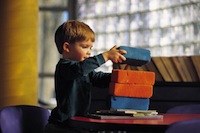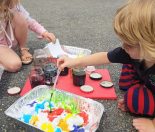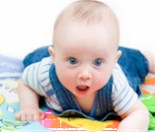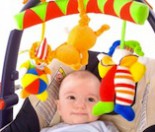Building blocks and toys give children a chance to build their world, and in doing so, blocks and building toys help your child develop a range of skills – intellectually, physically, socially, and emotionally.
What are Building Blocks and Toys?
Gone are the days when the only building blocks available were plain, square and wooden. Nowadays, building blocks and toys come in all sorts of shapes and sizes, and are made out of a range of materials including plastic, metal, wood and bamboo! Some connect, some stack, some lock, some move and some bend, but they all allow your child to use their imagination to build, make and create.
Educational toy stores offer a great selection of building blocks and toys, and cater for every age and stage of development.
What skills will my child develop through Building Blocks and Toys?
Each specific type of building toy will help your child to develop different skills, but there are some overarching benefits which are gained through all forms of block and building play.
Intellectual Benefits
Even at a young age, playing with building blocks and toys helps your child to develop skills in basic maths and physics. Creativity aside, building is all about size, shape, weight, leverage, and balance, and as your child works this out, their building and block play will become more and more complex. As the complexity increases, so does their concentration level.
Building and block play also helps children develop problem solving skills, especially once they begin to develop specific plans in their head. Making those plans a reality is not without problems – ask anyone who has ever built a house!
Physical Benefits
Babies and toddlers enjoy playing with very big blocks which require fine (small) motor skills to pick up, and gross (large) motor skills to move about. If you watch a toddler at play, you’ll see them use their entire body to get a big block in place. As children get older, building blocks and toys get more detailed and require precise movements with plenty of control. This type of play helps to develop fine motors skills which can be transferred to other learning areas.
Emotional and Social Benefits
At a young age, block play is an activity which your child can do alone, or together with friends. Creating sprawling farmyards or cities means that two children can be working on one ‘project’, but still maintain their independence. This is a great way to introduce children to cooperative play, as they can pick and choose how much they interact as the project develops.
Things to Consider when buying Building Blocks and Toys
As with anything, there are several things to consider when buying building blocks and toys. Obviously safety is an important aspect, as is making sure the toy is appropriate for the age and stage of your child. Staff at educational toy stores should be able to help you out in these areas, but here are some basic guidelines to set you in the right direction.
Building Blocks for Babies and Toddlers
Even babies and toddlers can play with blocks, and there are plenty of options to choose from. Nesting cups which can be stacked on top of each other are a good place to start, as are stuffed fabric blocks which are light, soft, and easy to grasp. You can make your own blocks for toddlers at home by covering shoe boxes or wine casks, and nappy wipe containers also make good building blocks for young children.
When buying blocks for this age group, it is important to look for blocks which are big enough to be picked up using large muscle movements, light enough to be carried around, and soft enough that they won’t cause injury when they coming crashing down. At this age children are not interested in building a ‘something’, they are simply moving, stacking, and building for buildings sake. You can get some great block toys for babies for less than $20.
Building Blocks for Pre-schoolers
By the time your child reaches 3 or 4 they will have started to build with purpose, but their projects will be big and sprawling, rather than detailed and precise. Children in this age group will delight in using their blocks to build farmyards, fences, towns and roads, so it’s a nice idea to give your preschool child accessories to use such as plastic animals, cars, people and buildings. These accessories will take their play to another level, and introduce aspects of role playing and dramatic play. You can buy accessories from toy shops and emporium type stores from just a few dollars.
There are some great wooden blocks available for this age group, and they come in all sorts of shapes and sizes. Generally speaking your child will still prefer playing with large blocks at this age, and there are some truly huge ones on the market. It’s a good idea to get a variety of shapes and sizes, so your child can have variety and flexibility with what they build. Wooden block sets start at about $40, but you can keep adding indefinitely – depending on how big you want your child’s projects to be.
At about 4 years of age, you can also start to introduce plastic brick blocks which connect together. There are several reputable brands available, and all offer a pre-school option which is slightly larger than their standard range. Be aware that brick blocks can be a choking hazard for young children, so make sure they are kept away from younger siblings or friends. Starter packs of brick blocks cost approximately $40 depending on the brand, and like all building sets can be added to indefinitely.
Building Blocks and Toys for 5 – 7 year olds
As your child starts primary school, their block play will start to focus more and more on making a ‘thing’ rather than a sprawling project, and for the next couple of years they will dart between the two. In addition to the large wooden block sets, children in this age group will enjoy working with smaller plastic bricks, and kits which make specific objects such as cars, trucks, boats and buildings. Project kits start at about $20, and go up in price depending on the size of the project.
Building Blocks and Toys for 8 – 12 year olds
Building blocks and toys get really exciting for this age group, with many of the kits becoming quite complex. They are far more than just blocks and bricks, these toys allow children to make real working machines. Educational toys stores have a great selection of kits which include electronics, nuts and bolts, bendable pieces, and moving parts, and you can pick up a starter kit for around $40.
Model and hobby stores also offer some great building toys for older children, and it’s a quick cross-over to model making which may also interest kids at this age. Cars and other vehicles are the most popular models for children to start with, and there are literally hundreds of designs to choose from. Like traditional building toys, model making requires concentration and attention to detail. Model kits start at about $25, but they quickly rise in price and can easily go into the hundreds.
For more specific advice on building blocks and toys, visit your local educational toy store and find out what they have on offer. Every brand, make and model offers different benefits, and is suitable for different ages and stages. Start with the basics, and as your child develops an interest in building, you can provide them with more complex tools and materials.







Great article. We have found BionicBlox to fit several of your age related categories making them a great value. http://www.bionicblox.com